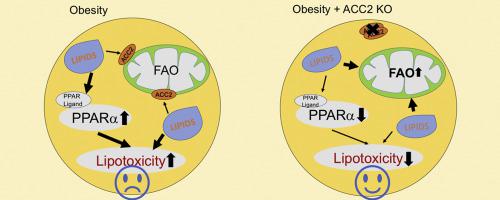Journal of Molecular and Cellular Cardiology ( IF 5 ) Pub Date : 2020-06-24 , DOI: 10.1016/j.yjmcc.2020.06.008 ZhengLong Liu 1 , Jeffrey Ding 2 , Timothy S McMillen 1 , Outi Villet 1 , Rong Tian 1 , Dan Shao 1

|
High fatty acid oxidation (FAO) is associated with lipotoxicity, but whether it causes lipotoxic cardiomyopathy remains controversial. Molecular mechanisms that may be responsible for FAO-induced lipotoxic cardiomyopathy are also elusive. In this study, increasing FAO by genetic deletion of acetyl-CoA carboxylase 2 (ACC2) did not induce cardiac dysfunction after 16 weeks of high fat diet (HFD) feeding. This suggests that increasing FAO, per se, does not cause metabolic cardiomyopathy in obese mice. We compared transcriptomes of control and ACC2 deficient mouse hearts under chow- or HFD-fed conditions. ACC2 deletion had a significant impact on the global transcriptome including downregulation of the peroxisome proliferator-activated receptors (PPARs) signaling and fatty acid degradation pathways. Increasing fatty acids by HFD feeding normalized expression of fatty acid degradation genes in ACC2 deficient mouse hearts to the same level as the control mice. In contrast, cardiac transcriptome analysis of the lipotoxic mouse model (db/db) showed an upregulation of PPARs signaling and fatty acid degradation pathways. Our results suggest that enhancing FAO by genetic deletion of ACC2 negatively regulates PPARs signaling through depleting endogenous PPAR ligands, which can serve as a negative feedback mechanism to prevent excess activation of PPAR signaling under non-obese condition. In obesity, excessive lipid availability negates the feedback mechanism resulting in over activation of PPAR cascade, thus contributes to the development of cardiac lipotoxicity.
中文翻译:

增强脂肪酸氧化对心脏中的 PPAR 信号传导负向调节。
高脂肪酸氧化 (FAO) 与脂毒性有关,但它是否会导致脂毒性心肌病仍存在争议。可能导致粮农组织诱导的脂毒性心肌病的分子机制也难以捉摸。在这项研究中,在高脂肪饮食 (HFD) 喂养 16 周后,通过基因缺失乙酰辅酶 A 羧化酶 2 (ACC2) 来增加 FAO 不会引起心脏功能障碍。这表明增加FAO本身不会引起肥胖小鼠的代谢性心肌病。我们比较了在食物或 HFD 喂养条件下对照和 ACC2 缺陷小鼠心脏的转录组。ACC2 缺失对全球转录组产生重大影响,包括下调过氧化物酶体增殖物激活受体 (PPAR) 信号传导和脂肪酸降解途径。通过HFD喂养增加脂肪酸在ACC2缺陷小鼠心脏中脂肪酸降解基因的标准化表达至与对照小鼠相同的水平。相比之下,脂毒性小鼠模型的心脏转录组分析(db/db ) 显示 PPARs 信号和脂肪酸降解途径的上调。我们的研究结果表明,通过遗传删除 ACC2 增强 FAO 通过消耗内源性 PPAR 配体负调节 PPAR 信号传导,这可以作为一种负反馈机制,防止在非肥胖条件下过度激活 PPAR 信号传导。在肥胖症中,过多的脂质可用性会抵消导致 PPAR 级联过度激活的反馈机制,从而导致心脏脂毒性的发展。



























 京公网安备 11010802027423号
京公网安备 11010802027423号